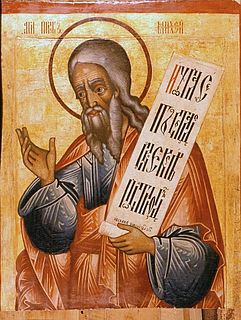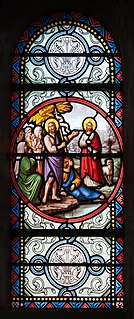Related Research Articles

Matthew 5:44, the forty-fourth verse in the fifth chapter of the Gospel of Matthew in the New Testament, also found in Luke 6:27–36, is part of the Sermon on the Mount. This is the second verse of the final antithesis, that on the commandment to "Love thy neighbour as thyself". In the chapter, Jesus refutes the teaching of some that one should "hate [one's] enemies".
Matthew 9:17 is a verse in the ninth chapter of the Gospel of Matthew in the New Testament.

Matthew 8:15 is the fifteenth verse in the eighth chapter of the Gospel of Matthew in the New Testament which relates the Healing the mother of Peter's wife.

Matthew 8:22 is the 22nd verse in the eighth chapter of the Gospel of Matthew in the New Testament of the Christian Bible.
Matthew 9:34 is a verse in the ninth chapter of the Gospel of Matthew in the New Testament.
Matthew 15:11 is a verse in the fifteenth chapter of the Gospel of Matthew in the New Testament.
Matthew 15:13 is a verse in the fifteenth chapter of the Gospel of Matthew in the New Testament.
Matthew 10:38 is a verse in the tenth chapter of the Gospel of Matthew in the New Testament.

Matthew 10:15 is the fifteenth verse in the ninth chapter of the Gospel of Matthew in the New Testament.
Matthew 14:12 is the twelfth verse in the fourteenth chapter of the Gospel of Matthew in the New Testament.
Matthew 12:33 is the 33rd verse in the twelfth chapter of the Gospel of Matthew in the New Testament.

Matthew 15:26 is a verse in the fifteenth chapter of the Gospel of Matthew in the New Testament.

According to the Hebrew Bible, Micah was a prophet in Judaism and is the author of the Book of Micah. He is considered one of the Twelve Minor Prophets of the Hebrew Bible and was a contemporary of the prophets Isaiah, Amos and Hosea. Micah was from Moresheth-Gath, in southwest Judah. He prophesied during the reigns of kings Jotham, Ahaz, and Hezekiah of Judah.

John 1:29 is the twenty-ninth verse in the first chapter of the Gospel of John in the New Testament of the Christian Bible.

John 1:7 is the seventh verse in the first chapter of the Gospel of John in the New Testament of the Christian Bible.

John 1:10 is the tenth verse in the first chapter of the Gospel of John in the New Testament of the Christian Bible.

John 1:23 is the twenty-third verse in the first chapter of the Gospel of John in the New Testament of the Christian Bible.

John 1:41 is the 41st verse in the first chapter of the Gospel of John in the New Testament of the Christian Bible.
Matthew 12:36-37 are verses in the twelfth chapter of the Gospel of Matthew in the New Testament.

Matthew 15:3-6 is a set of verses in the fifteenth chapter of the Gospel of Matthew in the New Testament.
References
- ↑ Robert Witham, Annotations on the New Testament of Jesus Christ. Dublin: 1730.
- ↑ John MacEvilly, An Exposition of the Gospel of St. John consisting of an analysis of each chapter and of a Commentary critical, exegetical, doctrinal and moral, Dublin Gill & Son 1879.
- 1 2 3 4 5 6 7 8 "Catena aurea: commentary on the four Gospels, collected out of the works of the Fathers: Volume 6, St. John. Oxford: Parker, 1874. Thomas Aquinas". 1874.
 This article incorporates text from this source, which is in the public domain .
This article incorporates text from this source, which is in the public domain .